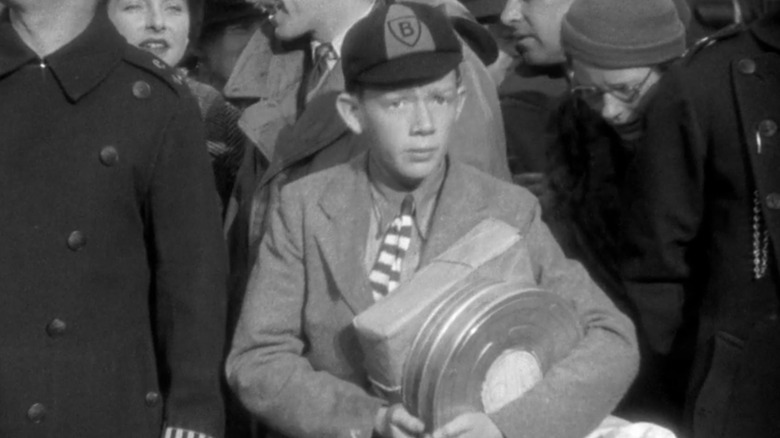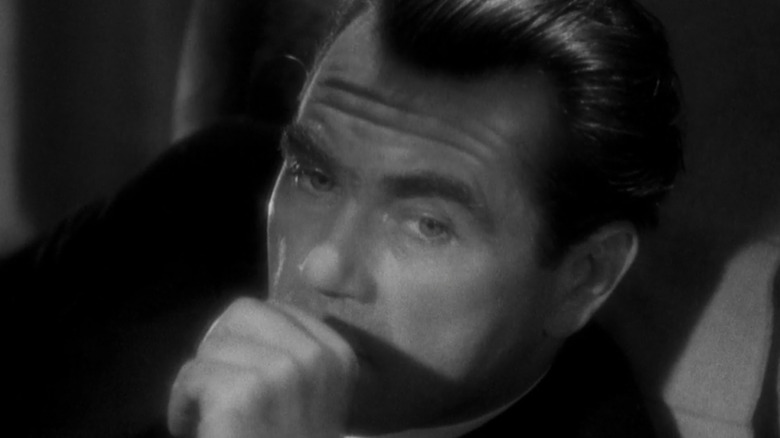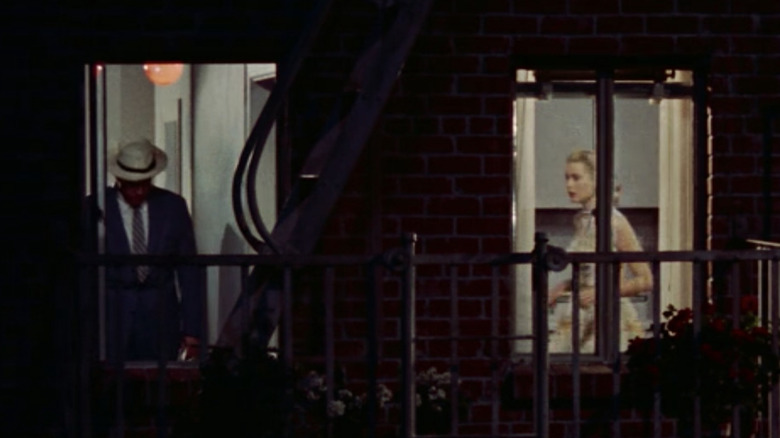The One Scene Alfred Hitchcock Regretted Filming The Most
Alfred Hitchcock has rightly earned the moniker of the "Master of Suspense." From his early silent films to the one-take experiment "Rope" to the genre redefining "Psycho," Hitchcock invented and reinvented ways of making an audience grip their armrests with sweaty palms. His example of showing the audience a bomb under the table has become shorthand for filmmakers and film lovers for how to generate overwhelming suspense during a scene. The difference between a bomb suddenly going off and knowing one will go off in five minutes is the part of that anecdote that everyone remembers, but there is a second part to this rule of suspense. This rule was one Hitchcock himself had to learn from after his own mistake in a film.
In an interview on "The Dick Cavett Show" back in 1972, Hitchcock explained how he regretted the construction of one sequence in his 1936 thriller "Sabotage." While it perfectly fell in line with that first part of his notion of suspense, including the use of a bomb, it was the resolution to that sequence that derailed what could have been an exceptional moment. Instead of the perverse enjoyment one normally gets out of Hitchcock ratcheting the tension, the sequence just ends up making you feel annoyed and regretful.
In need of some relief
"Sabotage" centers on cinema owner and professional saboteur Karl Anton Verloc (Oskar Homolka). His work has been mostly in destruction of property, or electricity, as in the film's opening scene, and we find him tasked with delivering a bomb to Piccadilly Circus that will go off at 1:45 P.M. Verloc, because of an aversion to killing and not wanting to be at the scene of the crime, tasks his new wife's younger brother (Desmon Tester) to transport the bomb, without him knowing. A perfect set up for Hitchcock to work his magic, but as he describes it:
"I made a terrible mistake of having a boy carry a bomb across the city. You, the audience, knew there was a bomb, and I built it up and up until the various clocks and all the hold ups. And you knew it was going to go off at 1:00, but I let the clocks go one minute past 1:00, two minutes, and work the audience up, and then I let the bomb go off. And he was on a bus, and it blew the whole thing completely."
A bigger mistake than misremembering that it was actually 1:45, not 1:00 (it was 36 years later, so we'll give the man a break), was that he let the bomb go off, killing the boy and everyone on the bus. The second part of the bomb suspense rule is that you need to give the audience a sense of relief after having set in the tension for so long.
"I had made the mistake in not relieving them at the end of the suspense. In other words, if you put an audience through the mill like that, you must relieve it. The bomb must be found and quickly thrown out of the window. Then it goes off out there, and the audience are relieved."
Suspense only works if there is a reversal. Building up suspense by saying one thing is going to happen and then delivering on that promise only serves to deflate the audience rather than get them to an emotionally satisfied place. It's not even the fact that a little boy was the one being killed that derails the scene, just the method. The discovery of the threat is so crucial. Avoiding it is what makes for great suspense. Discovering it and not being able to do anything about it is what makes for great tragedy. Hitchcock needs that avoidance, because at its core, suspense is an entertainment.
Learning from your mistakes
Ever since "Sabotage," Alfred Hitchcock has never made that mistake again. In "Rope," the corpse hidden in the wooden chest at a dinner party must be found. James Stewart needs to discover how Kim Novak assumed another woman's identity in "Vertigo." When Grace Kelly breaks into Raymond Burr's apartment in "Rear Window," she has to get caught. This discovery makes all of these films and their most famous sequences as iconic and beloved as they are. But very few people would call "Sabotage" one of Alfred Hitchcock's best films. It's a decent enough thriller, with an exceptional 76-minute running time. Its signature set piece, the sequence the entire film is built around, just fumbles the bag at the very end, and this is why, 36 years later, he still regrets the way it turned out. When Dick Cavett asks if he could do it over again, Hitchcock plainly says, "I'd never let the bomb go off." Time travel wasn't invented, so he had to settle with crafting perfect suspense sequences in dozens of films afterwards. That's a pretty good compromise.


